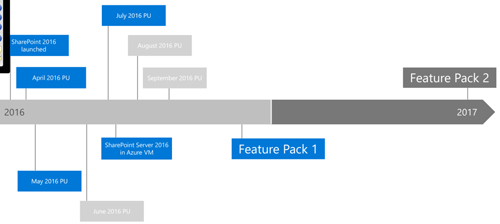News
Microsoft Launches SharePoint 'Hybrid Taxonomy,' Talks Roadmap Plans
- By Kurt Mackie
- February 23, 2017
Microsoft this week announced some new SharePoint features and capabilities, both immediately available and still to come later this year.
One of the news items this week is that the "hybrid taxonomy" feature for SharePoint Server 2016 and SharePoint Server 2013 is now at the "general availability" stage, according to a Tuesday blog post by Bill Baer, senior product marketing manager for SharePoint and OneDrive. General availability means that Microsoft considers it ready for commercial use. This feature was previously at the "preview" test stage with Feature Pack 1 released in November. The hybrid taxonomy feature helps with discovering information, bringing an organization's "taxonomy store to Office 365 enabling a single-source for creating and managing Terms, Term Sets and Groups through a single Managed Metadata Service," Baer explained.
Next, Baer announced that a new "hybrid auditing" feature, currently at the preview stage, will reach general availability "later this calendar year." This feature, too, is a Feature Pack 1 item. It pulls diagnostic log data into the Office 365 dashboard. Hybrid auditing is an optional feature that centralizes log information, but it works across "hybrid" infrastructures, meaning that it works for organizations that use SharePoint Server on premises along with SharePoint Online and Office 365 services. Here's how Baer described the hybrid auditing capability:
If you opt in for this service, audit logs get collected and uploaded to Office 365 regularly. From the Office 365 dashboard, you can view auditing and activity reports that show usage and reliability patterns in your SharePoint Server 2016 farm alongside data from your SharePoint Online tenant.
Baer had a lot more to say about Microsoft's overall hybrid concept in a talk on Wednesday (available on demand here) with Asif Rehmani, a SharePoint MVP and founder and CEO of VisualSP. He noted that there's no need to migrate data when using the hybrid auditing feature. The index gets stored in Office 365 and it also lets organizations take advantage of Office Graph and Delve for surfacing information.
Feature Packs
In general, Microsoft built SharePoint Server 2016 based on its SharePoint Online learnings. There's more innovation happening first in Microsoft's cloud services, Baer noted, but for the SharePoint Server 2016 product, Microsoft still brings some of those cloud-based feature improvements to the server product through its Feature Pack releases.
Baer added that Microsoft just releases Public Updates and Feature Packs for SharePoint Server 2016 now. Feature Packs are not standalone executables or .MSI files. There's no place to download Feature Packs. They basically are a bundle of Office 365 release rings, Baer explained. Microsoft pays attention to SharePoint UserVoice feedback when building its Feature Packs for SharePoint Server, he added. Feature Pack 1 capabilities were first available with the November Public Update, he noted.
Incidentally, Microsoft this week announced the release of the February Cumulative Update for SharePoint Server 2016. This release has Feature Pack 1 pushed into it.
Baer also explained that Microsoft is currently reviewing its plans for Feature Pack 2 for SharePoint Server 2016. He offered no timeline for a release, but he did present the following slide, which shows a Feature Pack 2 milestone perhaps situated near year's end:
 [Click on image for larger view.] SharePoint Server Feature Pack 2 plans. (Source: February VisualSP Web presentation with Bill Baer.)
[Click on image for larger view.] SharePoint Server Feature Pack 2 plans. (Source: February VisualSP Web presentation with Bill Baer.)
User Experience Improvements
More SharePoint news came in a Tuesday presentation by Mark Kashman, a Microsoft senior product manager on the SharePoint team. Kashman spoke with SharePoint expert and consultant Nick Brattoli in a Collab365 presentation (available on demand here).
Kashman's talk focused broadly on user experience improvements for SharePoint users. Most of the improvements described last year have either landed or are in production, he said. Microsoft's 2017 SharePoint roadmap will focus on end-user publishing and messaging, as well as some new creation tools, Kashman said, although he didn't offer a specific timeline.
Microsoft is making search results "more personalized" from the SharePoint tile in Office 365. It'll soon be like a search experience powered by the Office Graph, Kashman explained.
It's now possible to create Team News using the SharePoint Mobile application for iOS devices. In addition the file limit for moving and copying files, presently at 50MB, will get expanded in some future release.
Push notifications when news articles get created is something that's under consideration, Kashman noted. However, Microsoft doesn't want to send notifications for every SharePoint list modification. The idea is to have a "dynamic set of notifications that are relevant to you," he explained.
The SharePoint team is working on something akin to "site analytics," Kashman said, but it's trying to limit it to the right level of detail. He wasn't sure if the analytics would extend to mobile views, though, noting that Microsoft's partners have "done a wonderful job" in that respect.
Microsoft is committed to making the Modern Page experience extensible, Kashman said. The new SharePoint Framework, which was at the release candidate stage last month, lets organizations build their own custom WebParts, which can be added to a Modern Home Page, he added. The framework also supports the ability to do forms customizations, he said.
Support for "full page apps" via the framework likely will happen "within this calendar year," he added. Eventually, the full page apps will have multicolumn layout support, Kashman suggested. He also talked about the possibility of making it easier for "Communication Sites" to be created using templates. A Communication Site is used to broadcast team information, he explained.
About the Author
Kurt Mackie is senior news producer for 1105 Media's Converge360 group.